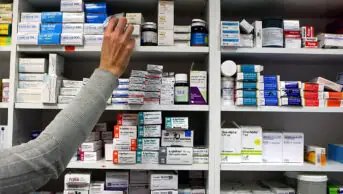This content was published in 2011.
We do not recommend that you take any clinical decisions based on this information without first ensuring you have checked the latest guidance.
The NHS is under increasing pressure to improve productivity and is expected to make £20bn of efficiency savings in the next four years. Finding innovative ways of working will be necessary to achieve this challenging target.
Around £8bn each year is spent by the NHS on prescription products of which unused or wasted medicines are estimated to cost at least £100m. There are particular points in a patient’s hospital journey where medicines waste is most likely to occur. These present opportunities for pharmacy staff to reduce waste and further demonstrate the value that pharmacy services add to patient care. Identifying and addressing medicines waste within the pharmacy department is also important.
The other resources associated with supplying medicines that are then wasted (e.g., staff time, heating and other fixed overheads) are not considered in this article, but “right first time” and other lean methodologies are the underlying principles to reducing waste of any type.
Patient’s own drugs
Reducing unnecessary dispensing and supply of medicines is an important way of reducing waste. Hospitals need to maximise use of patient’s own drugs (PODs) during inpatient stays by encouraging patients to bring their medicines into hospital and ensuring these are used correctly. There are many advantages to using PODs (such as reducing missed doses and facilitating quicker discharge), which can result in quality improvements as well as financial benefits to the overall health economy.
The benefits of patients self-administering their medicines in hospital are beyond the scope of this article but it should be noted that encouraging the use of PODs facilitates uptake of self-administration and these combined strategies are an effective way of reducing unnecessary medicines supply. The use of PODs tends to vary within trusts and, typically, elective admission areas achieve higher use of PODs than areas treating emergency admissions.
Pharmacy staff need to understand the practices in their trust and work closely with managers to ensure that patients (and their GPs) understand why they need to bring their medicines into hospital. A toolkit for moving medicines safely (the “green bag scheme”) has recently been published nationally[1].
Pharmacy departments are often asked why they routinely resupply long-term medicines that patients obtain from their GPs. This is a pertinent question —millions of patients in the UK are being treated for long-term conditions but typical acute admissions to hospital only last about five days. Individual trusts can evaluate how often they supply medicines for long-term conditions by generating reports on items such as cardiovascular drugs dispensed to surgical or orthopaedic wards (such drugs are rarely initiated in these areas).
Admission or assessment units
Busy accident and emergency departments and admission or assessment units are hotspots for medicines waste. The high turnover of patients means that, even with slick medicines reconciliation and dispensing processes, many patients will have been transferred or discharged by the time their medicines arrive on the unit. The Box below sets out some of the causes of medicines wastage often seen in these locations.
Box. Causes of medicines wastage in admission units
The following are common reasons for medicines wastage in hospital assessment and admission units:
- Patient’s own drugs not being used;
- Staff not enquiring about availability of medicines from home;
- Patients transferred without any of their medicines;
- Patients transferred with only some of their medicines (e.g., some medicines left in the refrigerator or Controlled Drugs cupboard);
- Patient being discharged before medicines are delivered from pharmacy;
- Discharge medicines supplied for patients who have existing supplies at home.
Pharmacy staff should undertake audits of medicines waste in admissions areas and review the pharmacy service. Discovering a substantial amount of medicines waste could make it easier to secure further investment in medicines management services to that clinical area.
Transfer
Moving patients from one ward to another is a common point in the patient journey at which medicines get lost. Transferring from busy admission areas is a particular problem due to their high turnover and continuous flow of patients. Hospitals should have a clear transfer procedure that ensures medicines from bedside lockers, refrigerators and Controlled Drugs cupboards are not forgotten.
Hospital staff should be held accountable for the safe transfer of medicines with patients. Unfortunately it is often easier to request another supply from the pharmacy rather than spend time trying to locate the misplaced drugs. If losing medicines is perceived as a normal occurrence, pharmacy staff and other managers will need to work together closely to tackle this mindset.
Pharmacy stock control systems should ideally flag duplicate requests before medicines are redispensed. This allows staff to challenge the request and locate any lost medicines — although this is not always practical, especially at times of reduced pharmacy staffing (e.g., weekends or on-call). Running retrospective reports on duplicate supplies of selected medicines may be useful (e.g., on Monday mornings to highlight drugs lost at the weekend) because it gives the clinical pharmacy teams a chance to locate and recycle such items.
Recycling
There will always be medicines supplied by the pharmacy that are stopped for genuine clinical reasons. Nursing staff need a clear procedure for returning or recycling such medicines at a ward level (this should include drugs needing refrigeration).
Engaging ward staff in medicines recycling is crucial, whether it be by using different coloured pharmacy boxes for recycling (similar to household rubbish) or by simply raising the awareness of the cost of individual medicines.
The need for clear recycling procedures also applies to pharmacy. Staff working in pharmacy stores need to work closely with the clinical teams, otherwise it is easy for individuals to assume that these tasks are someone else’s responsibility. With the increasing use of dispensing robots in hospital pharmacies, recycling procedures will need to be reviewed regularly. Limiting recycling to robot-friendly whole packs of medicines will result in substantial wastage of partially used packs. Addenbrooke’s Hospital, Cambridge, has recently developed processes for recycling part packs straight into ward stock (without reissuing through pharmacy systems).
Discharge
Patients should be asked if they have any PODs at home before their discharge prescription is processed. Unnecessary supplies will increase the risk of unintentional duplication as well as the hoarding of drugs. Drugs already dispensed by the hospital should be issued to the patient (against a discharge prescription) or recycled promptly if suitable.
The expectation (of patients and trust staff) that there will automatically be a new supply of medicines on discharge needs to be managed — this would ideally involve education before the time of discharge. Clear communication with patients or carers, GPs and community pharmacies is needed to ensure that patients receive the intended medicines. This helps to ensure continuity of care as well as reducing medicines waste.
Stock control within pharmacy
Pharmacy staff should be aware of the waste caused by medicines expiring within the pharmacy itself. Thorough stock control procedures will minimise wastage but, with the pressure of other activities, it is easy to forget routine tasks (such as stock rotation and checking expiry dates). With rapidly increasing drug spends in hospitals the cost of wastage within pharmacy may only be a small percentage of the total drug budget; however, this does not alter the fact that expensive drugs are expiring (sometimes needlessly) within pharmacy departments.
Staff need to be aware of the drugs held within their department that are about to expire. Ideally, any procedures for expiry date checks should be linked to a list of critical drugs for the hospital. Without clear procedures it is difficult to ensure that, in an emergency when a patient needs acritical but rarely used medicine, there will be a sufficient supply of in-date medicines available. An example of this is dantrolene injection, which is used in the treatment of malignant hyperthermia (a rare but potentially lethal anaesthetic emergency). Pharmacy staff will need to ensure that adequate supplies of in-date dantrolene are available in appropriate and accessible locations while also minimising wastage.
Pharmacy departments that operate aseptic services will need to assure themselves that these activities do not generate unacceptable amounts of waste. Regular audits of aseptic products (for example, total parental nutrition or intravenous additive products) that are returned unused or expired can help identify avoidable waste. Aseptic products made in advance (e.g., for use over a weekend) or for high turnover areas (e.g., admission units) can easily result in waste.
Summary
With increasing pressure on NHS resources all staff need to contribute towards reducing medicines waste. Pharmacy staff can directly influence the whole process of medicines usage, from avoiding unnecessary supply to recycling medicines that are no longer needed.
Reducing medicines waste will improve quality, save resources and allow staff to focus on roles that add value to patient care. There is a need and an opportunity for strong leadership from pharmacists to help reduce medicines waste.
Reference
- East and South East England Specialist Pharmacy Services. Moving medicines safely: Implementing a “Green Bag” scheme. August 2010. www.nelm.nhs.uk (accessed 1 December 2010).


